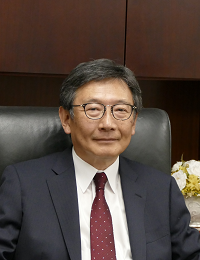Towards Medical Treatment in the Time of COVID-19 and After
Appeal to Support Future Medical Development at the Institute of Medical Science, The University of Tokyo
I would like to express my sincere thanks for your continued support for our educational and research activities.
The COVID-19 pandemic has claimed more than six million of human lives worldwide since 2020 and imposed significant restrictions on a variety of social and economic activities. The University of Tokyo has been fulfilling its mission of education, research, and social activities while taking various countermeasures to COVID-19. At the Institute of Medical Science, as a constituent body of the University of Tokyo, we are running education, research, and social activities to promote human health and the collaborative creation of a sustainable society in the with-corona and post-corona era.
As the institutional predecessor of the current Institute of Medical Science of the University of Tokyo (IMSUT), the Institute for Infectious Diseases was the first institute in Japan to be established for the development of methods for the treatment and prevention of infectious diseases. The Institute’s founding Dean, Shibasaburō Kitasato (1853–1931), was a researcher who not only succeeded in the cultivation of a pure tetanus bacillus culture but also pioneered a technique known as serotherapy that uses blood serum to treat and prevent microbial infection. In 1967, the Institute for Infectious Diseases was renamed as IMSUT. Since then, the Institute has expanded the scope of its research subjects beyond infectious diseases to include cancer and other intractable diseases in response to the needs of the times. Today, as one of the world’s centers of excellence for research on infectious diseases, IMSUT is promoting the development of methods of treatment and prevention for emerging and re-emerging virus infections, such as COVID-19. At the same time, we are working on the development of new therapeutic and preventive strategies built on the unique foundation of our basic research into cancer and other intractable diseases, as well. We cannot afford to lose momentum in our research activities, even in the midst of the COVID-19 pandemic.
IMSUT is working on not only the development of vaccines and therapeutic drugs for COVID-19 infection, but also basic and clinical research aimed at future medical treatments for cancer and intractable diseases with the use of new technologies such as AI and regenerative medicine. We also strive to provide new medical treatments through our affiliated hospital. Your continued support is invaluable to our research activities and will help us to promote the future medical development in the with-corona and post-corona era.
We sincerely appreciate your kind understanding and cooperation.
Makoto Nakanishi, Dean
The Institute of Medical Science, The University of Tokyo
How Your Support Will Be Used
As described above, IMSUT has expanded the scope of its research subjects in response to the needs of the times and has promoted the development of new therapeutic and preventive methods for a variety of diseases. However, it has not been easy to obtain sufficient financial support for early phase research from the government, private foundations, or companies. Furthermore, research for implementation entails significant and ongoing costs. Due to these circumstances, we have unfortunately been unable to obtain adequate research funds for the development and implementation of each project.
Your generous support will be used for many prospective research projects with the potential to accelerate the development and implementation of future medical treatments. All supported projects will be carefully analyzed and evaluated on the quality of research outputs throughout their support period and additional support will be directed as much as possible to the projects that are showing promising results.
![]() The Institute of Medical Science Future Medical Development Fund Website
The Institute of Medical Science Future Medical Development Fund Website

Project Leader
Makoto Nakanishi,
Dean of the Institute of Medical Science,
The University of Tokyo




